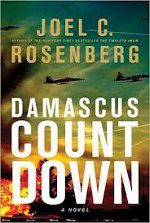
Most doomsday scenarios find people stockpiling canned goods and reaching out to estranged friends and family. In the case of David Shirazi, he’s not preparing for the end of the world; he’s trying to stop it. With the Middle East turning into a massive warzone, the American forces are pulling back. But the CIA has one last agent in the field, and he will stop at nothing to save the world.
Joel C. Rosenberg is well known for writing political thrillers and up until this last book, I’d have said his newest trilogy had almost too much in common with his previous five book series. Maybe the situation in the Middle East has come to the forefront of our news so often lately that it detracts from the fiction element for these stories. Still, they are very well written books, and I’ve been looking forward to the conclusion. And what a conclusion it was! Damascus Countdown not only perfectly tied up all the various plotlines of the trilogy, it gave all the different storylines a common ground they previously lacked: humanity. Mr. Rosenberg always does a fabulous job researching his books, but there was almost too much politics and policies in the first books. In this book, each political move is being made by very human characters that Mr. Rosenberg skillfully fleshed out. Even as the characters worked at cross-purposes and strove for different goals, you could sympathize with what each was trying to accomplish. You felt the desperation behind each move as Israel launched a preemptive strike on Iran. You felt the sense of moral superiority crash from under the feet of a man who ordered an attack on a high profile target…only to find out they had bombed a bus full of children. And above all, you felt David Shirazi come into his own.
Up until this last book, I felt that as a character David was a little lost. I mostly contributed this to fact he spent large portions of each book undercover. It’s hard to get a perfect sense for a character that is constantly playing other characters. But in Damascus Countdown, I felt that David really benefited from losing the support structure he was accustom to and having to strike out on his own. It was a little Jack Bauer-ish, but it did wonders for the character. I found it particularly fascinating that as David literally did everything and anything in his power to stop the war around him, he didn’t spend a lot of time scrutinizing his actions. Many Christians would be hesitant to take the steps he does, but at this point in the story, David knows exactly what is as stake, and he shows no hesitation. Yet, even though he clearly felt it necessary, I’m not sure he ever thought it was “good.” Instead, he had more of “the sin be upon my head” attitude. So often we talk about self-sacrifice in terms of the hero of a story laying down his life or offering it in exchange for another’s. While David certainly had no qualms about risking his life, I felt that his sacrifice was something far greater as he placed not just his body, but his very soul between the world and the forces of evil. As I turned the last page, I was surprised to feel that the story I’d just read was deeply connected to C.S. Lewis’ Last Battle. That it was a picture of a time and an event where truth and understanding are so jumbled together that was really matters in the end is keeping your oath for your oath’s sake. And that higher powers than the human mind will have to sort out in the end what was truly right.
My thanks to Tyndale House for providing me with a copy of Damascus Countdown, in return for my honest opinion of the book.